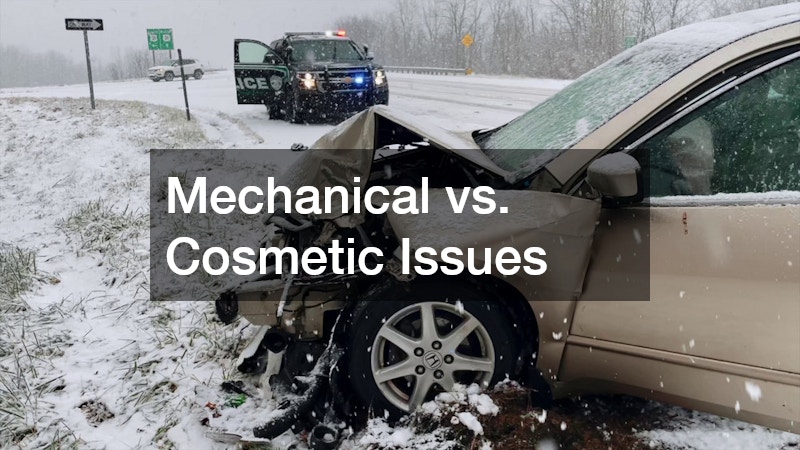This article explores the differences between auto body collision shops and mechanics, addressing common questions and providing clarity on when to seek each type of service. Understanding the distinct roles these professionals play can enhance your vehicle maintenance strategy and ensure your car receives the attention it needs. Whether dealing with significant aesthetic damage or intricate engine issues, knowing where to go can save time and money.
Services an Auto Body Collision Shop Provides
Focus on Structural Repairs
Auto body collision shops primarily focus on repairing damage incurred during accidents, particularly structural repairs. These establishments are equipped with specialized tools and expertise to fix frame damage, ensuring that vehicles maintain their integrity and safety. By realigning vehicles and restoring their exterior bodies, collision shops help ensure that a car not only looks as good as new but also performs reliably on the road.
Structural repairs are crucial because they affect the overall functionality and safety of the vehicle. After an accident, issues like bent frames or misaligned vehicle bodies can lead to long-term problems if not addressed promptly and correctly. Collision shop technicians utilize advanced techniques, such as frame straightening and alignment, to restore the vehicle’s original condition and safety standards.
In addition to frames and body alignment, collision shops also address underlying issues that might not be immediately visible. This comprehensive service ensures that all cosmetic and hidden damages are repaired, providing peace of mind to the vehicle owner. By focusing on both visible and structural repairs, collision shops ensure drivers are safe on the road and that their vehicles retain their value.
Paint and Cosmetic Work
Collision shops also offer extensive paint and cosmetic work, a vital part of their service offerings. They provide expert color matching and surface refurbishment to address scratches, dents, and other blemishes typically sustained during an accident. Such services ensure that the vehicle’s appearance is restored to its pre-accident condition, or even better.
Paint and cosmetic work require a keen eye for detail and a high level of precision. Technicians in collision shops are trained to assess the extent of damage accurately and match paint colors perfectly to the existing tones on the vehicle. Advanced techniques, such as blending and using high-quality paint materials, are employed to achieve flawless finishes.
Beyond aesthetic appeal, cosmetic work also protects the vehicle from future damage. By addressing issues such as rust and corrosion through detailed painting work and the application of protective coatings, collision shops promote the longevity of the vehicle’s exterior. This service not only restores visual appeal but also preserves the vehicle’s structural integrity over time.
Services a Mechanic Offers
Engine and Mechanical Repairs
Mechanics are essential for maintaining a vehicle’s core functionality, focusing on engine and mechanical repairs. They tackle an array of issues ranging from routine tune-ups to complex overhauls of key systems like the engine and transmission. Mechanics diagnose, repair, and maintain different mechanical components to ensure vehicles operate smoothly and efficiently.
Engine repairs often involve addressing problems with the fuel system, ignition, and other internal components that affect performance. While some issues can be easily fixed with parts replacements or adjustments, others might require in-depth knowledge of engine mechanics. A trained mechanic is equipped with both the tools and the expertise needed to identify intricate problems and execute reliable repairs.
Routine Maintenance
Routine maintenance is a core service offered by mechanics, essential for prolonging the life of vehicles and preventing major issues. Services like oil changes, brake inspections, and fluid checks play a key role in preventing minor issues from escalating into costly repairs. Regular maintenance ensures that vehicles are operating at peak performance and efficiency.
Oil changes, for example, are fundamental to maintaining engine health, ensuring that it remains well-lubricated and free of damaging contaminants. Mechanics also perform brake inspections to ensure the safety of vehicles, identifying any wear or potential failures before they become critical. Fluid checks, including coolant and transmission fluid levels, are essential in maintaining optimal operating conditions for various vehicle systems.
When Should You Choose One Over the Other?
Accident Damage
In the aftermath of an accident, choosing between a collision shop and a mechanic is crucial. Collision shops are the preferred choice for handling post-accident repairs due to their expertise in structural and cosmetic restoration. They are adept at dealing with the extensive damage that impacts both the vehicle’s appearance and safety features.
Seeking the services of a collision shop is essential when structural damage or bodywork is involved. These professionals can accurately assess and address damages that may not be immediately apparent, such as frame misalignment. Their focused approach ensures your vehicle is not just visually repaired but also meets safety and performance standards post-accident.
Mechanical vs. Cosmetic Issues
Deciphering whether a vehicle issue is mechanical or cosmetic can guide you in choosing between a mechanic and a collision shop. If a vehicle’s problems are mechanical—relating to the engine, transmission, or other key systems—a mechanic is the go-to professional. Their expertise lies in diagnosing issues affecting vehicle performance and conducting repairs that ensure continued operation.
Conversely, cosmetic issues fall within the specialization of a collision shop, focused on visual and structural integrity rather than mechanical functionality. These professionals excel in making vehicles look new again, addressing concerns like paint damage, dented panels, or misaligned frames. Understanding the nature of your vehicle’s issues can significantly influence the efficiency and effectiveness of the repair solution you choose.
Understanding the differences between auto body collision shops and mechanics empowers vehicle owners to make informed decisions. Collision shops specialize in restoring the vehicle’s structural integrity and cosmetic appeal after accidents. Meanwhile, mechanics ensure the vehicle’s ongoing performance through mechanical repairs and routine maintenance.


